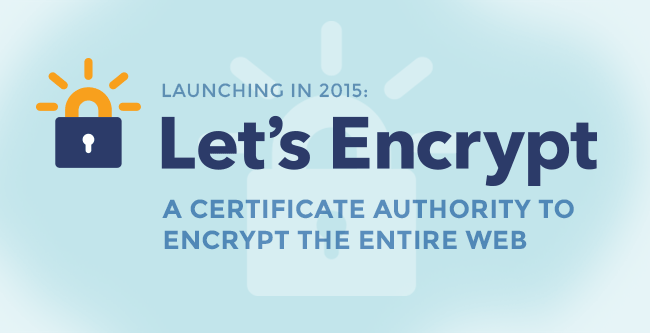Launching in 2015: A Certificate Authority to Encrypt the Entire Web by Peter Eckersley.
From the post:
Today EFF is pleased to announce Let’s Encrypt, a new certificate authority (CA) initiative that we have put together with Mozilla, Cisco, Akamai, Identrust, and researchers at the University of Michigan that aims to clear the remaining roadblocks to transition the Web from HTTP to HTTPS.
Although the HTTP protocol has been hugely successful, it is inherently insecure. Whenever you use an HTTP website, you are always vulnerable to problems, including account hijacking and identity theft; surveillance and tracking by governments, companies, and both in concert; injection of malicious scripts into pages; and censorship that targets specific keywords or specific pages on sites. The HTTPS protocol, though it is not yet flawless, is a vast improvement on all of these fronts, and we need to move to a future where every website is HTTPS by default.With a launch scheduled for summer 2015, the Let’s Encrypt CA will automatically issue and manage free certificates for any website that needs them. Switching a webserver from HTTP to HTTPS with this CA will be as easy as issuing one command, or clicking one button.
The biggest obstacle to HTTPS deployment has been the complexity, bureaucracy, and cost of the certificates that HTTPS requires. We’re all familiar with the warnings and error messages produced by misconfigured certificates. These warnings are a hint that HTTPS (and other uses of TLS/SSL) is dependent on a horrifyingly complex and often structurally dysfunctional bureaucracy for authentication.
…
This shouldn’t bother US security services since they were only gathering metadata and not content. Yes?
The Wikipedia article on HTTPS reads in part:
Because HTTPS piggybacks HTTP entirely on top of TLS, the entirety of the underlying HTTP protocol can be encrypted. This includes the request URL (which particular web page was requested), query parameters, headers, and cookies (which often contain identity information about the user). However, because host (website) addresses and port numbers are necessarily part of the underlying TCP/IP protocols, HTTPS cannot protect their disclosure. In practice this means that even on a correctly configured web server, eavesdroppers can infer the IP address and port number of the web server (sometimes even the domain name e.g. www.example.org, but not the rest of the URL) that one is communicating with as well as the amount (data transferred) and duration (length of session) of the communication, though not the content of the communication.
No guarantees of security but it is a move in the right direction.
I first saw this in a tweet by Tim Bray.

